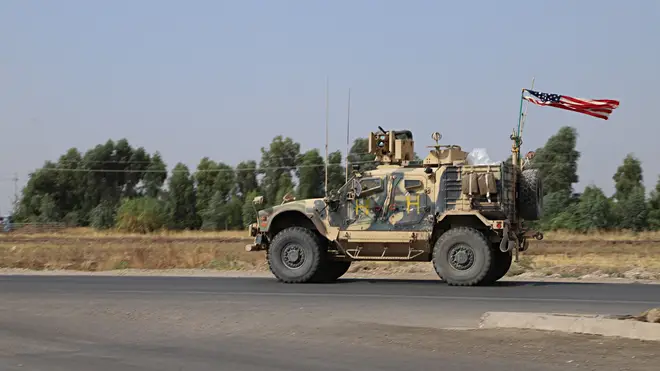
Paul Brand 10am - 12pm
27 October 2019, 09:25 | Updated: 27 October 2019, 13:15
IS leader Abu Bakr al-Baghdadi is believed to have been killed in a US raid in Syria - but a former counter-terrorism chief told Andrew Pierce what the significance of this all is.
Andrew Pierce spoke to former Head of Counter-Terrorism at the Ministry of Defence and former Senior British Military Advisor to the US Central Command Major General Chip Chapman.
Andrew Pierce said: "A cynic might say this is great timing for Donald Trump because he's faced an awful lot of criticism for pulling out American troops. It's led to some IS camps where IS prisoners have apparently been able to escape.
"So this is very handy for Donald Trump."
Major General Chip Chapman said: "It is convenient timing and its happenstance but if they've have had the information to get Baghdadi at anytime between July 2014 and now, they would have taken that opportunity because he was number one on the high value target list and absolutely had that $25 million bounty which you talked about.
"It is good news in that sense. The bad news of course, is that in the last message that he put out he did talk about prioritising the freeing of IS prisoners and he quoted something about breaking down the prison walls which was a slogan they originally used in July '13.
"This is something which is likely to happen because the the policy of withdrawing the support from the Kurds in northern Syria means that there is more chance of these prisoners actually breaking out.
So you're going to have this sort of revival of IS, IS 2.0 even though IS 1.0 is still there. Although it's not there in a governing capacity anymore."

Andrew asked if he would just be replaced by another terrorist.
Major General Chip Chapman replied: "Well, that's an interesting one, Andrew because you have to have certain defined characteristics to be a caliph. Now he was Caliph Ibrahim right and three things really need to pertain.
"Firstly, you need to e have a direct lineage on the Quraysh tribe, which is from the Prophet Mohammed.
"Secondly, you've got to be an Islamic scholar and al-Baghdadi had a PhD in Islamic theology.
"And thirdly, you need to be sort of appointed by an eight man Shura council. Now the leadership bench of IS has been knocked over severely by the counterterrorist reach of the Americans.
"So that will be an interesting one of what happens there. Now of course the brand will live on regardless so that he's gone because the things which are the identifiers as it were of Islamism, as opposed to Islam, are still there.
"You know, the belief that Islam is not a religion but a divine political ideology, the demand that Sharia law should be synchronised with state law and the insistence, for example, that the people of the book is a global block rather than simply a religious identity.
"And of course, it's worth saying in a UK perspective, that in the last counter-terrorist figures for arrest that we have, which are as of June this year, 266 people were arrested in that year. Of which still the majority, somewhere around 80 per cent, have an Islamist persuasion.
"There is a growing right wing extremism, but still largely Islamist. When Osama bin Laden was killed, one of the outcomes of that was a spike in attacks which was led by Abu Du'a as he was called them.
That was Baghdadi's name in counterterrorism circles when he was a senior leader in Al Qaeda in Iraq."